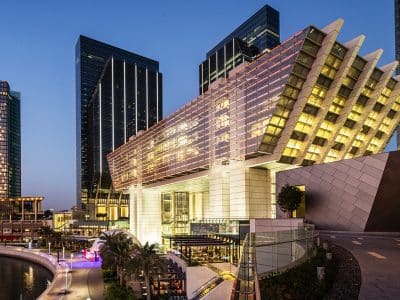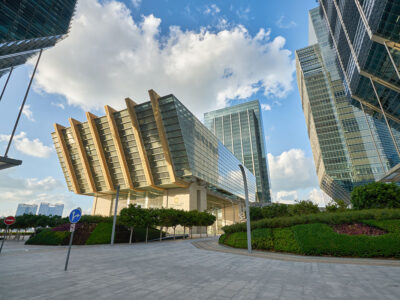1/ How do you see Dubai as the global Islamic economic capital – what stage is it at, and how much can it grow?
There is huge untapped potential in the global Islamic economy. Islamic economies of the world are estimated to represent more than US$8 trillion in GDP. With a population of 1.6 billion Muslims, growing at twice the rate of the global population and with disposable income of $4.8 billion there is incredible and rising demand for halal products and services.
Dubai is the ideal place as the capital of the Islamic economy as it already has significant advantages and opportunities for growth in all the potential areas of Islamic economy.
For instance, Dubai has a long history in Islamic finance. Dubai Islamic Bank was the first bank in the world to offer Islamic banking options when it was launched in 1975. Dubai is now facilitating Islamic finance and insurance professional community convergence and this position is further complemented by the UAE’s developed world-class banking sector.
The food manufacturing sector is halal and can easily be expanded to meet domestic demands, with new and innovative halal products, and external markets in Asia, Africa.
Meanwhile, Dubai has a strong tourism sector that already has successful halal tourism options and which can easily incorporate more.
The formalisation of the initiative Dubai: Capital of the Islamic Economy by His Highness Sheikh Mohammed bin Rashid Al Maktoum, UAE Vice President and Prime Minister and Ruler of Dubai, has drawn all this varied expertise under one idea and over the next three years Dubai will move to position itself as a world leader of the Islamic economy.
2/ How much is the industry worth to Dubai in terms of revenue and jobs?
Given the huge possibilities it is difficult to put a figure on the Islamic economy and its worth in terms of revenue and jobs.
However, looking at the Islamic finance industry alone, it is estimated that there are only 38 universities worldwide which are producing 5,000 Islamic finance graduates per year, whereas the demand is for 50,000 professionals.
Article continued on next page…
In terms of attracting manpower, Dubai has a significant advantage as it is a city that offers a good work-life balance, with personal financial incentives and other cultural factors like standard of living and smooth functioning business infrastructure.
3/ Who are the key competitors – would it be fair to say UK and Malaysia are?
In terms of Islamic finance then the UK and Malaysia are both major centres. London has started to have an interest in issuing Sukuk and we see potential for cooperation. While Malaysia is by far the largest global issuer of Sukuk with US$51.6 billion issued in the first half of 2012. This compares to Saudi Arabia’s US$8.8 billion (the largest issuer in the GCC) followed by the UAE’s US$5.3 billion.
However, the Islamic economy is not just about finance, but also other crucial aspects, like halal food, tourism, leisure, education, standardisation and certification. Dubai has a lot of existing strengths in these areas, especially as it is a global tourist hub and an existing financial centre, and so there is huge opportunity to grow and develop the Islamic economy.
Dubai can open up the Islamic economy and make it much more international. This means engaging with countries like the UK and the US, which have Muslim populations but who have been so far slow to appreciate the opportunities of the Islamic economy. This idea also extends to the participation of non-Muslims, something which we are seeing all the time.
4/ What are the key advantages for Dubai as the capital of the Islamic economy?
The opportunities for Dubai are significant. The city has a thriving private sector and is a favoured destination for business and leisure. Dubai can attract a skilled workforce because of its high quality of life and financial benefits that other cities cannot, which lends itself well to developing and growing the sectors of the Islamic economy.
Meanwhile, domestic demand is being driven by a fast-growing local population and its position as a regional business hub for the Middle East and Africa. Dubai has the potential to export its skills in Islamic economy sectors to other markets in Southeast Asia, Africa and the Middle East and is already forging potential partnerships with other markets and Islamic organisations around the world.
5/ What new initiatives are being launched to promote the industry in Dubai?
Dubai has identified seven key pillars and 46 different initiatives where it will focus its resources and strengths.
These include creating a logistics corridor with Dubai at its centre for halal products, setting out guidelines for accrediting halal hotels and tourism facilities, establishing an Islamic Economy faculty in Zayed University, research centre for Islamic finance, and another for standards and certification would help advance the policy side of the Islamic Economy.
Article continued on next page…
Developing and adopting standardisation alongside market efficiencies, competitiveness and sustainability concerns is an important area as these will lay the foundation for the Islamic economy. Dubai has already started to make progress in this area with the establishment of the Dubai Centre for Excellence in Islamic Banking and Finance. This centre, which is part of the Hamdan bin Mohammed e-University, will provide students with masters and foundation certificates in Islamic banking and finance. It will also conduct research to advance the professional and theoretical foundation for Islamic banking and finance and play a role in improving access to Islamic banking and finance education for the Arab world.
Dubai can also export its expertise to markets abroad to tap into opportunities. For example, the strongest untapped markets for Islamic finance are likely to be in Turkey, the Levant and South East Asia where large Muslim populations provide good bases for growth.
6/ Can you give an overview of the Islamic finance industry – how big it is and current growth rates?
Dubai is already a regional financial hub with Islamic financing options that can easily be developed further. According to industry sources, Islamic finance globally is expected to reach US$2 trillion by 2015, up from an estimated US$1 trillion in 2010. Islamic finance is an important part of the UAE and Dubai’s finance sector. Combined Islamic assets account for a fifth of all banking assets in the country. The sector caters towards a growing demand for Sharia-compliant and ethically conscious market in Dubai and the UAE which is expected to grow as both the population and income of residents continue to increase.
7/ What role is the Chamber of Commerce playing in this development?
Dubai Chamber’s main involvement is in bringing and organising major events related to the Islamic economy to Dubai. We have organised the Global Islamic Economy Summit in partnership with Thomson Reuters on November 25th and 26th. This is the first event to bring together world-class experts to directly address the greatest challenges and opportunities in this new economy. GIES attendees will have the opportunity to hear the latest updates and trends within the global Islamic economy and access high-level speakers. To further encourage networking and business partnerships, attendees will also have access to the Interactive Zone on the GIES website where they can review the attendee list and email other delegates prior to the event.
Meanwhile, business leaders who are inspiring the future of the Islamic economy will be recognised with an Islamic Economy Award, at the Opening Ceremony of the Summit, directed by HH Sheikh Hamdan bin Mohammed bin Rashid Al Maktoum, Crown Prince of Dubai and Chairman of the Executive Council. There are 14 Islamic Economy Award categories including Islamic Microfinance; Halal Food; Travel; Media; SME Development; and a prestigious Lifetime Achievement Award. Nominations will close on October 25.
Dubai Chamber has also been chosen to organise the 10th session of the World Islamic Economic Forum next year. This is one of the world’s largest gatherings to share knowledge, experience and expertise in Islamic economy. Dubai Chamber has been tasked with organising this forum, which will be held in November next year and will see more than 2,500 global Muslim political and economic leaders in attendance. Dubai has an excellent track record of delivering these kinds of events, and the best facilities in the Middle East and I am sure the event will be a success.




